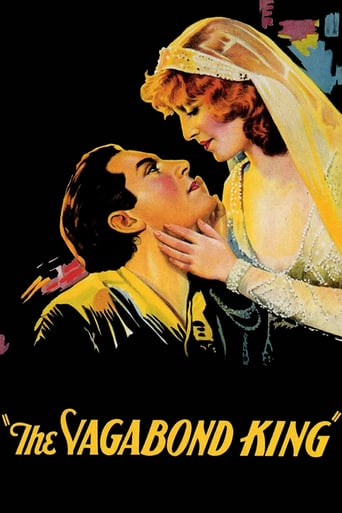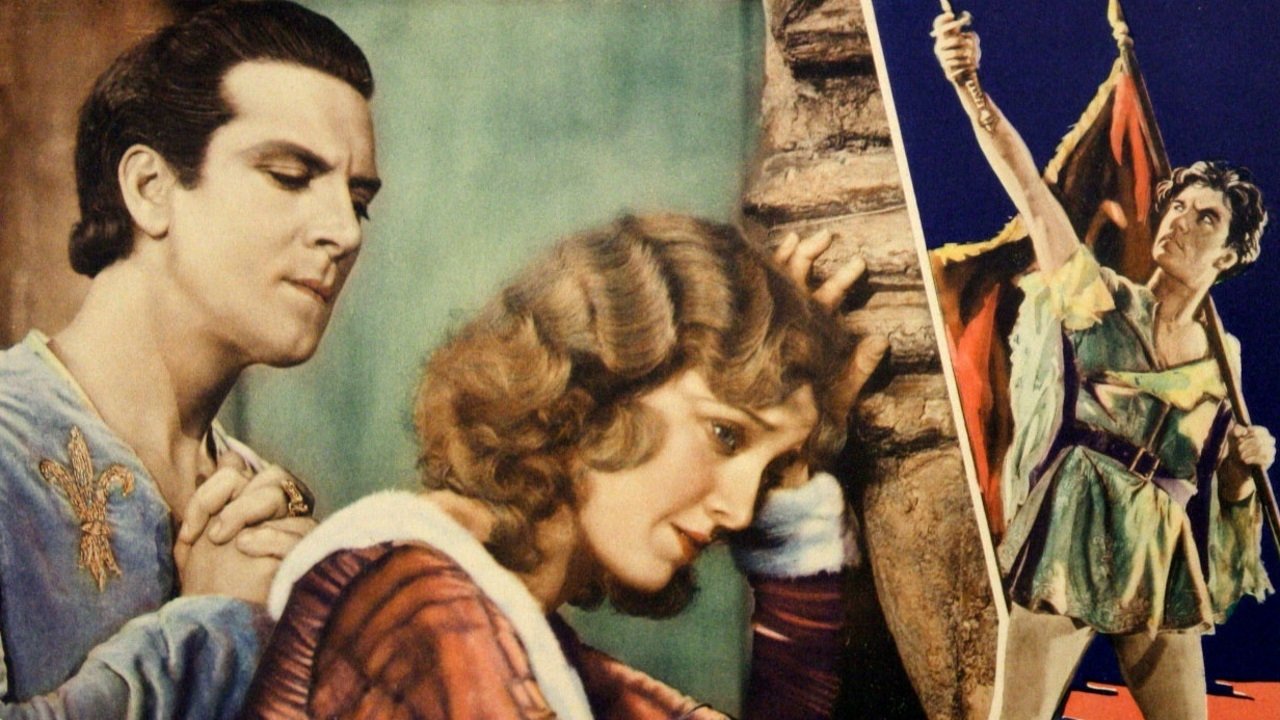mark.waltz
Only a year after "The Love Parade", Paramount failed to repeat the success with this film version of the successful Rudolph Friml operetta. Whether a hit at the box office or not, it fails to stand the test of time when compared to the Jeanette MacDonald/Maurice Chevalier operettas (and even MacDonald's others with different leading men) because of poor direction and an even worse performance by its leading man, Broadway tenor Dennis King.I have to honesty tell movie musical fans to avoid this one first and go straight to the 1956 Kathryn Grayson/Oreste color remake, or even the 1938 non-musical "If I Were King" with Ronald Colman and Frances Dee. Made to look like Svengali or Rasputin in his peasant gear, King frightfully overacts, and in close-ups, his profile is up there with the ugly hag in Disney's "Snow White and the Seven Dwarfs". The score is pleasantly sung, but even MacDonald later referred to King's big love song, "Only a Rose" as "Only a Nose". The second lead is played by Lillian Roth who was a comic scene stealer in "The Love Parade" and plays basically the same role that Myrna Loy did in the original film version of "The Desert Song" the year before and in the same part that Rita Moreno would essay 26 years later. She is pretty much wasted. The villains are all one-note, and MacDonald is lacking the iron butterfly feistiness that would make her a major success in the series of films she did with Chevalier and much later at MGM with Nelson Eddy. The Friml songs are good, but not as memorable as his score for "Rose Marie" which MacDonald of course did only six years later with better success.
bbmtwist
This is a terrible early talkie with a flamboyant 19th century ham performance by Dennis King in the lead and a nondescript one from Jeannette MacDonald. It was filmed entirely in 2 strip Technicolor, which makes up for some of its failings. A restored print is housed at UCLA and it is the only known surviving color print. The elaborate art direction deservedly earned an Oscar nomination.It is available on DVD from Loving the Classics, which uses an old battered 16 mm black and white television print (MCA-TV), which is 3/4 screen, blurry, washed out and with poor sound. The silence surrounding the dialogue is full of white noise.There is the lovely score - MacDonald has three numbers: Someday, Only A Rose and Love Me Tonight.Songs:Act One: 1:08:10King Louis - King Hymn - Chorus SOMEDAY – sung by MacDonald If I Were King - King What France Needs - King Song of the Vagabonds – King ONLY A ROSE – sung by MacDonald, joined at end by King SOMEDAY – reprise – sung by MacDonald Huguette's Waltz - sung by Roth LOVE ME TONIGHT – sung by MacDonald and KingAct Two: 36:30Pool Procession - Chorus Song of the Vagabonds – reprise – King Requiem – Chorus ONLY A ROSE – reprise finale – sung by Macdonald and KingThis is for die-hard fans of Rudolf Friml (composer) and Jeannette MacDonald.MacDonald scenes: 11Act One: Church Interior, Street, King's Observatory, Observing Villon's transformation, Palace Walk, Balcony Scene, Observing Villon and Herald from Burgundy; Act Two: Garden, Huguette's Death Scene, Church, Gallows.
theowinthrop
The early sound films were in one sense a step forward and in another sense two steps back. If you look at the late silent films, like Chaplin's "A Woman Of Paris" or Murnau's "Sunrise" the stories are sophisticated, as is the acting and the directing techniques. But the films are mimed plays - we don't hear any dialog (we may hear musical accompaniment). Then comes 1927 and "The Jazz Singer". Finally we hear something,and it is worthwhile (it's Al Jolson's voice - talking and singing). But even there huge parts of that first talkie are silent (the Warner Brothers were not willing to destroy everyone at once). By 1930, except for Chaplin (constructing "City Lights"), most of Hollywood was switched to talkies. But the early problems of acoustics and sound recording make many of these films difficult for modern audiences. Also, a reluctance to trust voices of established stars led to over reliance on stage performers.Dennis King happened to be an exceptionally talented actor and singer. Oddly enough (due to his own choice) he decided to stick to stage work until television came into it's own (and then he willingly got into that new medium). This is fine, because it leaves a record of his acting abilities (and of his singing). But he only made a few movies in Hollywood, and the best known one is not his initial film "The Vagabond King", but his supporting turn as comic villain and lover in "The Devil's Brother" / "Fra Diavalo" with Stan Laurel and Oliver Hardy. It's ironic that that performance is recalled, but understandable given the alternative two (although both are good performances). His gentle vicar in "Between Two Worlds" has a moving scene where he leads the passengers on that odd ocean liner into a quiet, childlike prayer - a very fine sequence, by the way. And his performance as the brilliant gutter poet of the 15th Century France, Francois Villon, is preserved in "The Vagabond King", one of the leading American operetta of the 1920s. But the former part is not the lead role of "Between Two Worlds", and the productions standards of "The Vagabond King" are hopelessly dated today.Still "The Vagabond King" has much going for it: four top performances by King, Jeannette MacDonald as Katherine (the King's niece), O.P. Heggie as the crafty old "Spider King" Louis IX of France, and Lillian Roth as Villone's girlfriend and (ultimately) savior Huguette. Given the datedness of the dialog (from Justin McCarthy's turn of the century play, "If I Were King", the leads manage to squeeze every drop of value out of it. Sometimes without the dialog (look at the scene where a shaved Villon awakes in a royal bedroom, and slowly realizes things have changed). Look at Roth's moment singing of her love for Villon in the tavern (when he is missing and considered in custody). MacDonald has to play a "perfection" part - a perfect princess who Villon falls quickly in love with and who slowly falls for him (when he is made respectable by the King's whims). It is a thankless role (she can't have much fun being perfect) but she radiates charm, and her singing songs like "Only a rose" (that one in duet with King) reminds the viewer of things to come in her future when her partners were named Maurice or Nelson, not Dennis. Heggie's King does not sing in the film, but he gets the craftiness of the "Spider King". But not quite the brilliance of the political genius of that sinister man. Catch Basil Rathbone's version in the Ronald Colman version of IF I WERE KING later on to see that. However Heggie does capture Louis' least likable trait - he was one of the most vindictive men of his age.Fighting against them is the sound equipment and direction. Some aspects of the stage production were saved. The different types of servants serving Villon in the palace (fat men as waiters bringing breakfast), ladies in waiting to amuse him, and dwarfs to help dress him) must have been in the original Broadway production. Another positive thing is the amount of Friml's score (at least three of his best songs are in the film, including the celebrated "Sons of Toil and Danger". But the sound quality is awful, and the director at times fails to show any talent at all (like his failure to show two duel scenes between King and his enemy the Grand Marshal of France (a somewhat wasted Warner Oland - did part of his part end up being cut?)).It's interesting to note that only three years later (1933) King appeared in "The Devil's Brother". Tendencies to emote which he had in 1930 (another failure of the director of "The Vagabond King" to control) were replaced by a more relaxed style, and the sound quality improved remarkably well too. Therefore it's another plus for the Laurel & Hardy comedy (as King's best performance on film) as opposed to the historically more important Villon in the current movie. All of which is terribly ironic. But for the strength of his performance, as well as his three leading co-stars (I wish Oland's was as good as theirs were), and the Friml score, the film is worthy of an "8" out of "10".
bkoganbing
The chance to see a major Broadway star recreate his role for the screen is an opportunity not to be missed. It's sad though that Dennis King was not given proper direction for the screen in his performance.Of course he and Jeanette MacDonald sing the Rudolf Friml-Brian Hooker songs beautifully. We even get a bonus of Lillian Roth singing the Waltz Hugette which was a big hit for her. If you remember in the biographical film, I'll Cry Tomorrow, Susan Hayward as Roth sings that song among others identified with Roth on the soundtrack. Probably a lot more of you remember the straight dramatic version of Justin Huntly McCarthy's play If I Were King that starred Ronald Colman eight years later. Seeing both I know where all the songs are, it's like seeing Pygmalion after you've seen My Fair Lady. The Colman version had a much lighter touch to it though. Dennis King played it as a stalwart hero, a little less of the rogue that Colman was. O.P. Heggie was also a far more serious Louis XI than Basil Rathbone was, though I saw aspects in Heggie's performance that Rathbone no doubt imitated.Probably The Vagabond King was done just a tad too early. The early sound recording techniques don't help and in a few years King would have learned to dial it down a bit for the screen. Take a look at his dramatic non-singing role as the country vicar in Between Two Worlds.King was Rudolf Friml's favorite Broadway leading man. He was the original Mountie in Rose Marie for those of you thought the part originated with Nelson Eddy and besides The Vagabond King he also starred as D'Artagnan in The Three Musketeers. For some reason that operetta was never made into a film and I wish it had. Even Dennis King playing it like he would for the stage would have been better than that awful thing with Don Ameche and the Ritz Brothers.The Vagabond King is certainly a film for Jeanette's legion of fans and it is a chance to see a Broadway star recreate his role for the screen despite the flaws.


 AD
AD


